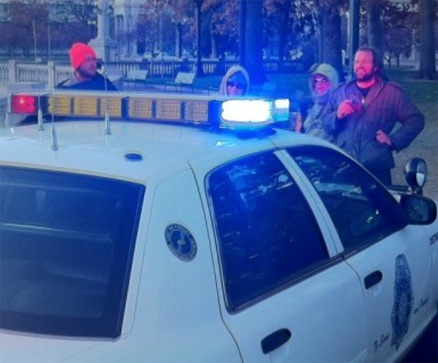
DENVER, COLORADO- Activist Corey Donahue’s 11-11-2011 protest case is still outstanding. The recently surrendered fugitive is charged with inciting a riot in the first months of the Occupy Denver encampment, when supporters crowded a police cruiser and began to rock it in protest of Corey’s third arrest. Clouding this nostalgic look back at DPD’s mishandling of mass demonstrations are the quasi-legal steps the city took to constrain the protest.
It turns out Corey’s felony riot charges were used to convince a Denver court to grant protection orders to two state troopers who considered themselves personal victims of Occupy Denver’s assertive tactics. As a resut, Corey was prevented from leading demonstrations into areas when those officers were deployed, and he didn’t know which those officers were.
The measure was of dubious legality and so far remains shrouded in disinformation. Were two officers “seriously injured”, as news outlets reported, in the so-called riot of Nov 11? Except for their official statement, no evidence was ever provided by DPD. What were the injuries and who were the officers?
Can police invoke the protection of a blanket injunction to stop public demonstrations whenever they want? Can a police department enforce protection orders and pretend its subjects can remain anonymous? These are the questions which Denver police face as they push charges against one of their most outspoken antagonists.
Can law enforcement officers unknown to a defendant file for restraining orders against the public they serve and protect? Can police require that ordinary citizens maintain a prescribed distance from them in a public space?
Encamped on the grounds of the capitol, at the peak of an ongoing protest movement, Corey Donahue was in no position to push back with a legal challenge.
Denver has since used an even more abusive method, designating “area restrictions” to keep active protest leaders out of places like the state capitol, Civic Center Park, and 16th Street Mall. DPD cite the arrestees’ repeated arrests as justification. This probation stipulation may be applicable for criminal recidivists, in particular domestic violence abusers, but it is hardly constitutional when applied to free speech. Denver’s practice hasn’t been challenged yet, for want of sympathetic plaintiffs.
Giving police protection orders, to prevent specific demonstrators from assembling near police lines, would seem to fall in a similar category of judicial misconduct.
